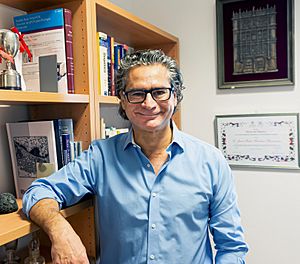Juan Pedro Bolaños facts for kids
Juan Pedro Bolaños Hernández (born April 18, 1964) is a Spanish biochemist and neuroscientist. A neuroscientist is a scientist who studies the brain and nervous system. He is a professor at the University of Salamanca.
Professor Bolaños studies how our brain cells get and use energy. This field is called neuroenergetics. His work helps us understand how the brain works and what goes wrong in certain brain diseases. He has won many awards for his important research.
Contents
Early Life and Education
Juan Pedro Bolaños was born in Santa María de Guía de Gran Canaria, Spain. His family was involved in pharmacy, and as a child, he helped his father in a clinical analysis laboratory. This experience sparked his interest in chemistry and biology.
He went on to study Pharmaceutical Sciences at the University of Salamanca, finishing with honors in 1987. He then earned his doctorate (a high-level university degree) at the same university. During his studies, he also did research in Oxford, England. His doctoral thesis in 1992 was about how a medicine called valproic acid affects the central nervous system.
From 1993 to 1995, he worked as a researcher at the Institute of Neurology at University College of London.
A Career in Science
In 1996, Bolaños became a professor at the University of Salamanca. A year later, he started his own research group. By 2007, he was a full professor at the university.
His research group is part of the Institute of Functional and Genomic Biology. It is known as a "Group of Excellence" in the Castilla y León region of Spain. The group works with other research centers in Spain and around the world.
Professor Bolaños has also helped review scientific articles for famous journals like Science and Nature Reviews Neuroscience. This means he helps make sure the research published is of high quality.
Brain Research
Professor Bolaños's research is like being a detective for the brain. He tries to understand the tiny molecular parts that control how brain cells use energy and protect themselves from damage.
Why is Brain Energy Important?
Our brain cells, called neurons, need a lot of energy to send messages. This process is called neurotransmission. Bolaños studies the pathways that give neurons the energy they need.
His work aims to find new ways to help with brain problems, including neurodegenerative diseases like Parkinson's disease and Alzheimer's disease. These are conditions where brain cells stop working correctly over time.
Key Research Projects
- Brain Cell Protection: His team studies how to protect neurons from dying. This could lead to treatments for brain injuries or diseases like amyotrophic lateral sclerosis and Huntington's disease.
- Astrocytes and Brain Function: He also studies astrocytes, which are star-shaped cells that support neurons. He looks at how their energy use affects how the brain works.
- Batten Disease: His group discovered why neurons break down in Batten disease, a rare genetic disorder. They also suggested a possible way to stop it.
Awards and Honors
Professor Bolaños has received many awards for his teaching and research.
- 2005: Marie Curie Excellence Award from the European Commission.
- 2019: María de Maeztu Prize for scientific excellence from the University of Salamanca.
- 2021: Premio Castilla y León de Investigación Científica y Técnica e Innovación, a major science award in his region of Spain.
- 2022: Bachelard Lectureship Award from the European Society for Neurochemistry.
He is also a member of several important scientific groups, including the International Society for Neurochemistry (ISN) and the Spanish Society of Biochemistry and Molecular Biology (SEBBM).
Scientific Impact
Throughout his career, Professor Bolaños has guided many students and published over 150 scientific articles. His work is so influential that Stanford University has named him one of the most notable scientists in the world.
Some of his most important research articles explain:
- How a protein linked to Parkinson's disease affects the way brain cells use sugar for energy.
- How special molecules made by astrocytes can actually protect neurons.
- The link between the brain's energy use and social behavior.
See also
 In Spanish: Juan Pedro Bolaños para niños
In Spanish: Juan Pedro Bolaños para niños


